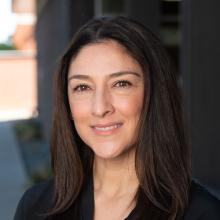Member Spotlight: Melissa Y. Delgado, Ph.D.
Associate Professor and Director of Graduate Studies, Human Development, and Family Science at The University of Arizona; Member of the SRCD Latinx Caucus
Why did you decide to choose Developmental Science as a course of study or career?
I grew up on the Nogales, Arizona-Sonora border, where crossings from the U.S. to Mexico and back were part of our family’s regular weekly routine, visiting family, seeing doctors, and getting groceries. I also spent many summers on road trips to visit family in Northern Arizona and California. These experiences allowed me to appreciate the great diversity in Mexican-origin children, youth, and families and the various contexts that afforded a great variety of opportunities; it sparked a special kind of curiosity that I carried with me when I left my hometown to go to college, just a few hours north. Through my undergraduate research opportunities, I learned I could turn this keen interest in making sense of the heterogeneity of Mexican-origin families and their youths’ normative development into a career in developmental science.
What/Who inspired you to go into Child Development Research?
I was unaware of Child Development research until I met Mark Roosa as an undergraduate research assistant. After I began my work as a bilingual RA in his lab, Mark developed intentional independent studies with me where he introduced so many of the greats, including the work of Cynthia Garcia Coll, Carola Suárez-Orozco, Jean Phinney, Ruben Rumbaut, Vonnie McLoyd among many others. He also helped prepare me for academic reading and writing and to give me the confidence to believe I belonged in graduate school to train for a career in Child Development research.
Do you have a mentor or mentors who have been instrumental to your career and, if so, who and how?
Yes! My mentors have been critical to my career, starting with Drs. Mark Roosa and Kimberly Updegraff who guided me in every way through my thesis and dissertation work (and beyond!) with a critical eye and so much patience. Dr. Sandi Simpkins provided a postdoc opportunity that allowed me to think outside of my quantitative box and immerse myself in Mixed Methods Research, the methods that have best aligned with my current and ongoing research questions. Adriana Umaña-Taylor has been generous in pushing me to think judiciously at various milestones. There is no way I would have survived graduate school or my faculty positions without my graduate and postdoc peer mentors, including Rajni Nair, Edna Alfaro, Mayra Bamaca, Phil Briggs, Emily Cansler, Devon Hageman, Sarah Killoren, Ginger Lockhart, Francisco Palermo, Norma Perez-Brena, Tierney Popp, Russ Toomey, Lorey Wheeler, Amanda White, Rebecca White among, yes, so many others (!). I have also continued to build on this mentoring network with junior and senior colleagues at my institution and through professional organizations such as SRCD. I can’t stress enough to students how important it is to build your mentoring network!
What is your best SRCD memory?
Hands down – The Black Caucus’ Sankofa Soiree! Their 50th anniversary event will be something I will never forget. What a great night!
How do you relax when you are not teaching or conducting research?
Nothing has me at ease more than when I’m with my family – Mateo, Nicolás, José, mi mamá – traveling, watching movies, exploring restaurants, listening to music, being still; hot yoga is healing; Re-learning how to play tennis brings me relaxing joy; dancing alone to Mexican/Spanish pop music is such a great stress reliever, having tea is always a comfort; reading books out on my hammock always ends in one of the best naps; and, there’s no life without friend time.
